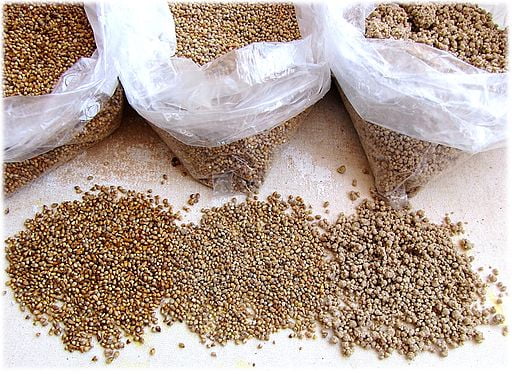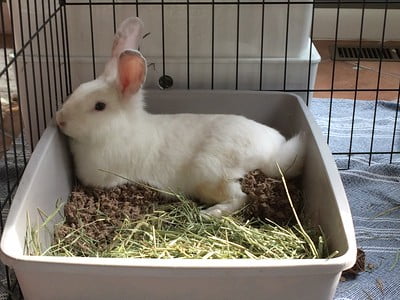Last Updated on February 21, 2023 by Marjon Ramos
Rabbits are one of the most nervous animals on the planet. Almost anything can scare them.
We can’t blame them though; it’s the only way they can survive in the wild where there are countless threats in any direction.
Even Tyr and Freya, my two rabbits, who I have had for a few years now, would still get scared whenever I moved unexpectedly or heard a loud, unfamiliar sound.
But over the years, I’ve figured out what works whenever I notice that my rabbit is nervous.
You can calm your rabbit down by giving them space, providing toys, and cuddling with them. You should also leave them alone if your efforts are not working.
Forcing your rabbit to do anything would only make things worse.
Now that I’ve given you the gist of the article, read on as I explain in more detail how you can calm down your scared rabbit:
Table of Contents
What frightens a rabbit?
Before we discuss what you can do to calm down your rabbit, we must first discuss why your rabbit is afraid in the first place.
Not addressing what’s frightening your rabbit would make the problem worse.
Here are the most common reasons why a rabbit would get scared:
- Loud noises (heavy machinery, fireworks, gunshots, barking dogs, etc.)
- Predators nearby (cats and dogs)
- Unfamiliar things, people, and animals.
If you have one of these in your area, you need to find a way to address them.
As an example, if your rabbit is getting scared of loud sounds, you can try moving him to another room. You could also put a thick blanket on your windows to muffle the sounds.
If your rabbit is getting scared of a predator nearby (dogs or cats), you should move your rabbit away from the predator until they are comfortable with their presence.
What should you do to calm down your scared rabbit?
As rabbit owners, we want our pets to feel safe and be as comfortable in our home as possible. It’s always a bad day when we see our pets getting scared over something.
If you notice your rabbit is scared of something, here are some tips to help them relax:
1. Give them space.
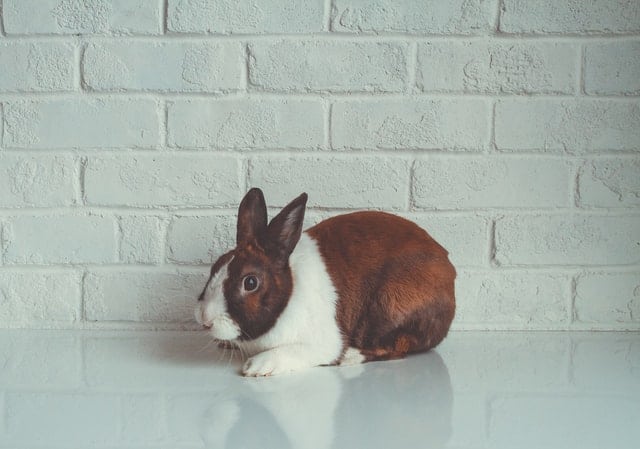
If your rabbit gets scared whenever you’re close to them, it’s better to let them be and give them some space.
Forcing your rabbit to do anything they don’t want would scare them and would likely make them cautious of you in the future.
Also, be careful not to pick up your rabbit when they are panicking.
A lot of rabbits end up getting injured when they thrash and their owners drop them.
The proper way to handle the situation (nervous rabbit) is to give them space and try to lure them out with treats.
Wait for them to come to you on their own terms.
Forcing your rabbit to cuddle with you when they’re scared would make them feel trapped.
Letting your rabbit run away and hide is actually a good thing and would help calm them down.
2. Provide treats and toys.
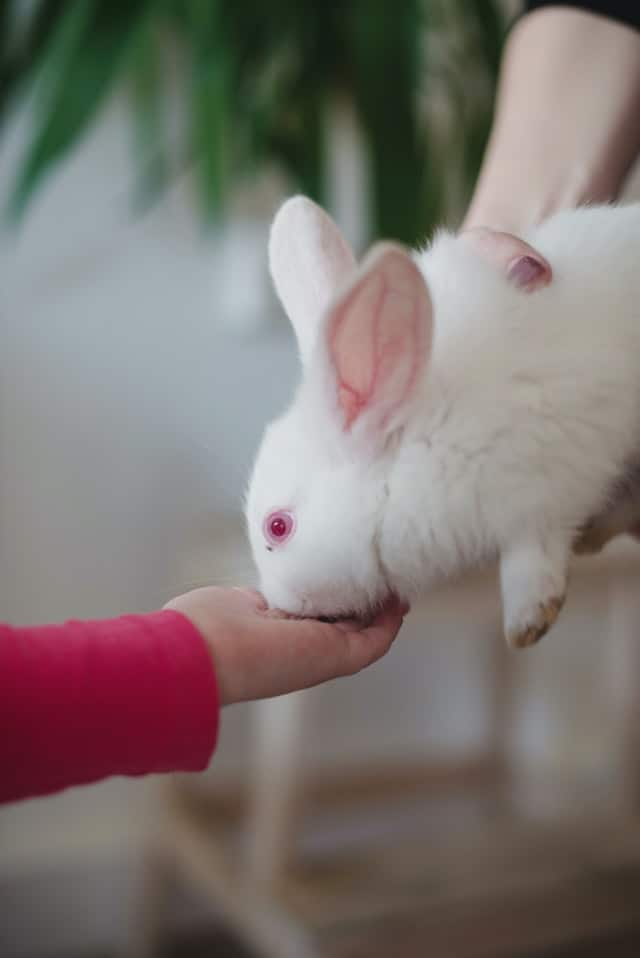
Another way to calm your rabbit down is to give them treats or toys.
This method is especially effective when your rabbit is in a new environment or you just got them.
I did this to every rabbit I ever had. I make sure to give them treats the first time I got them and whenever I move them to a new place.
But make sure that your rabbit is at least 7 months old before giving them any treats.
Feeding excessive amounts of treats to young rabbits could trigger life-threatening digestive problems.
If your rabbit is more than 7 months old, you still need to limit (two times per week) the amount of treats you give them.
A small piece of fruit 1-2 times per week should be enough to satisfy your rabbit’s sweet tooth.
Finally, rabbit toys should be bought from trusted pet stores.
A lot of rabbit toys sold by untrusted pet stores are glued or painted with unsafe chemicals to save money.
Go for rabbit toys that are made of willow or jute. This kind of toy has the added benefit of grinding down your rabbit’s teeth.
Here’s a great video on safe rabbit toys:
3. Cuddle session.
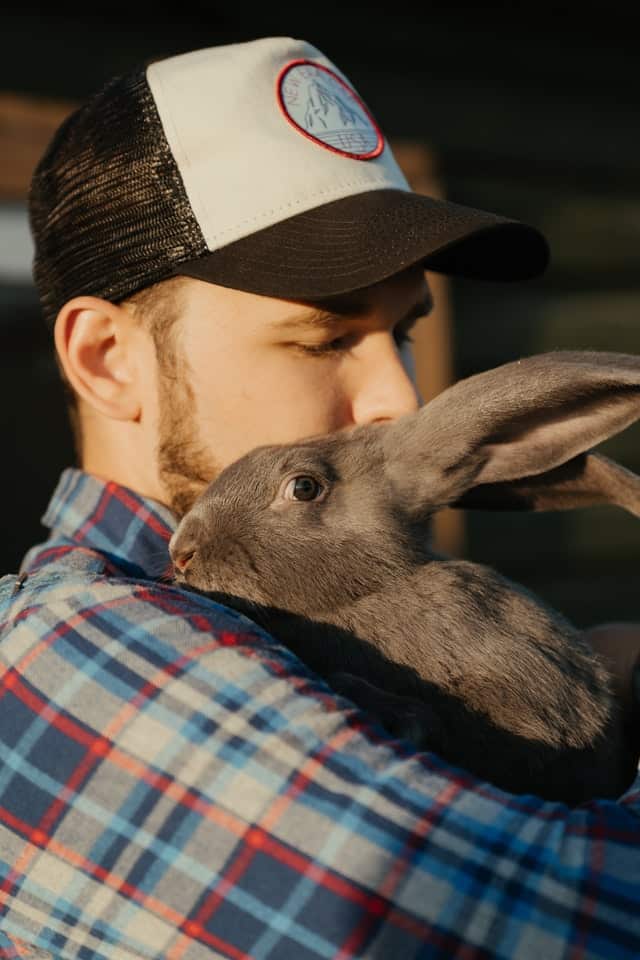
You can also try cuddling or petting your rabbit if they’re scared. But you need to wait for them to come to you on their own.
Forcing your scared rabbit to come to you will only make them suspicious of you and increase their fear.
When petting your rabbit, stick to areas that most rabbits enjoy, like behind the ear, back, and head.
Try avoiding your rabbit’s neck and stomach because most rabbits dislike being touched in those areas.
You should also avoid picking up your rabbit whenever you do this.
Just lie on the floor with your rabbit and cuddle with them until they calm down.
You should also talk to your rabbit often whenever you cuddle with them so that they can get familiar with your voice.
4. No sudden movements.
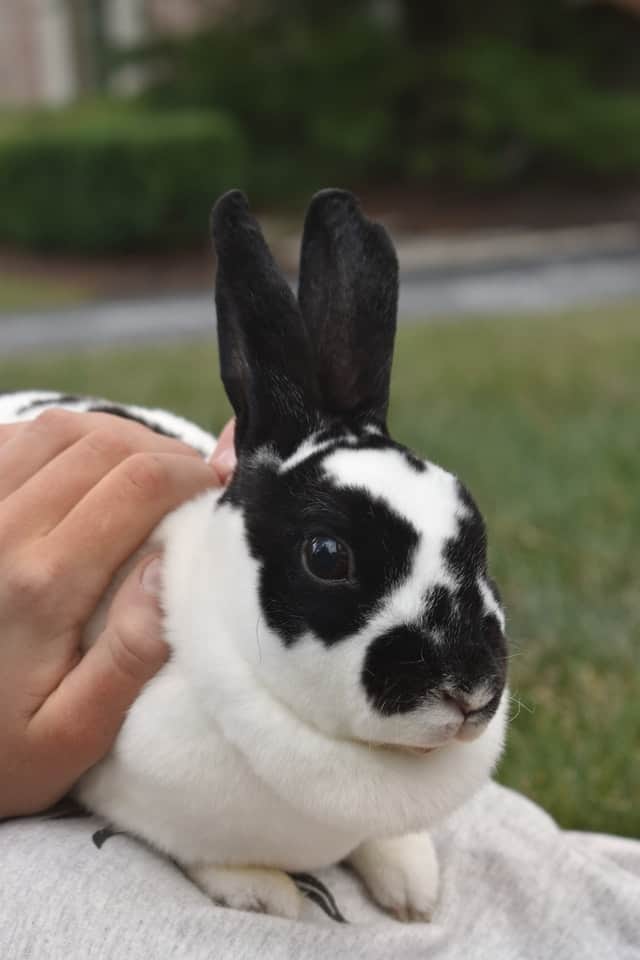
Another thing you should remember when your rabbit is scared is to stop any sudden movement when they are watching you.
Rabbits are always on the lookout for predators.
Their instincts would kick in when that predator suddenly moved.
Even though I’ve had my rabbits for many years, they still get scared when I move suddenly.
After one of those incidents, I noticed that my rabbits would become distant from me for a few days.
But now they quickly realized that it was me and that there was nothing to worry about.
Do not be alarmed if your rabbit suddenly becomes fearful of you.
It’s just their instinct kicking in.
Signs your rabbit is scared

Wild rabbits are really good at hiding any signs of weakness because they are prey animals and it would just get them killed in the wild.
The same is true for domesticated rabbits.
It’s important that we learn to recognize what our rabbit feels so that we will know what to do.
You do this by closely watching their body language.
Here are some signs that your rabbit is scared:
- Wide eyes
- Refusing to move
- Aggression
- Hiding
- Not eating
- Stomping (kicking using their hind legs)
- Aggressive chewing
When you notice any of this behavior, there’s a good chance that your rabbit is scared of something.
Start implementing the tips I mentioned above on how to calm them down.
When to consult a veterinarian?
When you’ve done everything to calm your rabbit and it’s not working, we recommend that you take your rabbit to a rabbit-savvy vet.
Rabbits that are ill or unwell often show signs of anxiety towards their owners.
If your rabbit has these additional symptoms, get them checked by a vet immediately:
- Refuses to eat (e.g., appetite changes)
- Diarrhea or any changes to their stool
- Sudden change in behavior
- Changes in their fur
- Respiratory changes
Conclusion
You can calm down your rabbit by giving them space, cuddling with them, providing treats and toys, and stopping any sudden movements.
You should also make it a habit to spend a lot of time with your rabbit when you first got them.
This would ensure that when the time comes that they did get scared of something, they already trust you.
If you’ve already tried everything to help calm your rabbit down and they are still scared for seemingly no reason, you should consult your veterinarian.
Some rabbits would show signs of nervousness and would seclude themselves while suffering from a medical condition.
Cite this article:
Sources and Further reading
- Buseth, Marit Emilie., and Richard A. Saunders. Rabbit Behaviour, Health, and Care. CABI, 2014.
- Patry, Karen, et al. The Rabbit-Raising Problem Solver: Your Questions Answered about Housing, Feeding, Behavior, Health Care, Breeding, and Kindling. Storey Publishing, 2014.
- Basic Rabbit Care

